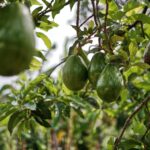Q&A: WAO VP on El Niño struggles, sustainability and new market players

Avocado consumption worldwide has steadily increased in recent years, positioning the Hass variety as one of the most popular fruit choices among consumers.
FreshFruitPortal.com spoke to Michael Horney, vice president of the World Avocado Organization (WAO), regarding the current state of the industry, main challenges and future growth.
"As we all know, Latin America continues to be the main source of the fruit, however, there are new origins, especially in Africa and southern Europe, that have joined the industry and are growing in an interesting way in recent years," Horney says.
As for varieties, Horney indicates that Hass is the queen worldwide, as the most marketed cultivar, complemented by green-skinned varieties.
"Some markets have a high consumption of green skin, such as Eastern Europe, Russia, Israel, Brazil and Colombia. But the main advantage of the Hass variety is that it travels, has a longer shelf life and that has allowed the development of the industry market in recent years," Horney assures.
Related articles: Bagged avocado consumer preference up 9%
How has the crop been affected by El Niño this year?
Looking ahead to next season, El Niño is definitely going to affect the sector globally, as there are higher temperatures in many of the regions and changes in the rainfall pattern and it is expected that next year there will be slightly smaller sizes.

WAO VP Michael Horney.
What are the main challenges producers face?
We are coming from a year with extremely high freight rates, which affected our transportation and inputs. There is a challenge for demand to keep up with the increase in supply that we are going to have in the coming years.
Maintaining good productivity and crop efficiency are the main challenges.
What innovations is the sector developing?
There are new varieties such as Luna, which was launched by the University of California (at Riverside), that seek to cover new windows. There is development on rootstocks, upon which Hass is grafted, giving greater plasticity in terms of the soil and climate.
This forces us as growers to be much more careful when producing and harvesting fruit, so that the levels of dry matter are correct and that it is a traveling fruit.
Offering ripe fruit to the consumer forces us to have greater controls and guarantee a better consumer experience. On the part of consumers, whether recurrent or new, the past experiences of unripe fruit have been decreasing a lot in recent years with technologies such as ultrasound, with much more sophisticated ripening chambers, which help us to provide a better experience.
What is the Valle de Olmos project being developed in Peru?
It is a project that takes water from the Amazon and brings it to the Pacific basin through an engineering work, quite large and unique in this part of the world. In addition, it makes water available to producers in a highly desert area.
The fruit has the advantage that it's shipped one and a half to two months before the start of the season, allowing Peru to be in the market early and with fruit of very good quality.
In addition, Olmos has brought an important change to the small communities that used to live in this desert area with formal employment and development.
What are the challenges for consumers?
The avocado has the great advantage of not having a substitute in the market.
Many potential consumers, not knowing the fruit and not knowing the optimal point of consumption, have had bad experiences. We are doing a good job in this regard, disseminating information on how to consume it and at what time.
It is a fruit that can be consumed from a very young age to very old.
What is the next step the industry should take?
We are working on having winter season origins as WAO partners, so we can continue with year-round production. We are teaming up with experts and professionals who are part of the avocado chain to strengthen our messages.














































